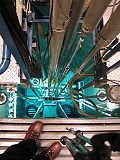Nuclear reactor
Nuclear Reactor
A Nuclear reactor is a device used to initiate and control a self-sustained nuclear chain reaction. Nuclear reactors are used at nuclear power plants for electricity generation and in nuclear marine propulsion. Heat from nuclear fission is passed to a working fluid (water or gas), which in turn runs through steam turbines. These either drive a ship's propellers or turn electrical generators' shafts.
History[edit]
The first nuclear reactor was constructed in 1942 at the University of Chicago by Enrico Fermi. The reactor was called Chicago Pile-1 and was used to demonstrate a self-sustaining nuclear chain reaction.
Types of Nuclear Reactors[edit]
There are several types of nuclear reactors, including:
- Pressurized water reactor (PWR)
- Boiling water reactor (BWR)
- Heavy water reactor (HWR)
- Graphite-moderated reactor
- Fast neutron reactor (FNR)
Nuclear Fission[edit]
Nuclear fission is the process that fuels a nuclear reactor. In this process, the nucleus of an atom is split into two smaller fragments by a neutron. This process releases a large amount of energy in the form of heat and radiation.
Safety and Accidents[edit]
Safety is a critical concern in the operation of nuclear reactors. Accidents can release harmful radiation into the environment. Notable nuclear accidents include the Chernobyl disaster and the Fukushima Daiichi nuclear disaster.
See Also[edit]
References[edit]
<references />
|
|
|
-
Nuclear_reactor
-
Nuclear_reactor
-
Nuclear_reactor
-
Nuclear_reactor
-
Nuclear_reactor
-
Nuclear_reactor
-
Nuclear_reactor
-
Nuclear_reactor
-
Nuclear_reactor
-
Nuclear_reactor
-
Nuclear_reactor
-
Nuclear_reactor
Ad. Transform your life with W8MD's Budget GLP-1 injections from $49.99


W8MD offers a medical weight loss program to lose weight in Philadelphia. Our physician-supervised medical weight loss provides:
- Weight loss injections in NYC (generic and brand names):
- Zepbound / Mounjaro, Wegovy / Ozempic, Saxenda
- Most insurances accepted or discounted self-pay rates. We will obtain insurance prior authorizations if needed.
- Generic GLP1 weight loss injections from $49.99 for the starting dose of Semaglutide and $65.00 for Tirzepatide.
- Also offer prescription weight loss medications including Phentermine, Qsymia, Diethylpropion, Contrave etc.
NYC weight loss doctor appointmentsNYC weight loss doctor appointments
Start your NYC weight loss journey today at our NYC medical weight loss and Philadelphia medical weight loss clinics.
- Call 718-946-5500 to lose weight in NYC or for medical weight loss in Philadelphia 215-676-2334.
- Tags:NYC medical weight loss, Philadelphia lose weight Zepbound NYC, Budget GLP1 weight loss injections, Wegovy Philadelphia, Wegovy NYC, Philadelphia medical weight loss, Brookly weight loss and Wegovy NYC
|
WikiMD's Wellness Encyclopedia |
| Let Food Be Thy Medicine Medicine Thy Food - Hippocrates |
Medical Disclaimer: WikiMD is not a substitute for professional medical advice. The information on WikiMD is provided as an information resource only, may be incorrect, outdated or misleading, and is not to be used or relied on for any diagnostic or treatment purposes. Please consult your health care provider before making any healthcare decisions or for guidance about a specific medical condition. WikiMD expressly disclaims responsibility, and shall have no liability, for any damages, loss, injury, or liability whatsoever suffered as a result of your reliance on the information contained in this site. By visiting this site you agree to the foregoing terms and conditions, which may from time to time be changed or supplemented by WikiMD. If you do not agree to the foregoing terms and conditions, you should not enter or use this site. See full disclaimer.
Credits:Most images are courtesy of Wikimedia commons, and templates, categories Wikipedia, licensed under CC BY SA or similar.
Translate this page: - East Asian
中文,
日本,
한국어,
South Asian
हिन्दी,
தமிழ்,
తెలుగు,
Urdu,
ಕನ್ನಡ,
Southeast Asian
Indonesian,
Vietnamese,
Thai,
မြန်မာဘာသာ,
বাংলা
European
español,
Deutsch,
français,
Greek,
português do Brasil,
polski,
română,
русский,
Nederlands,
norsk,
svenska,
suomi,
Italian
Middle Eastern & African
عربى,
Turkish,
Persian,
Hebrew,
Afrikaans,
isiZulu,
Kiswahili,
Other
Bulgarian,
Hungarian,
Czech,
Swedish,
മലയാളം,
मराठी,
ਪੰਜਾਬੀ,
ગુજરાતી,
Portuguese,
Ukrainian













